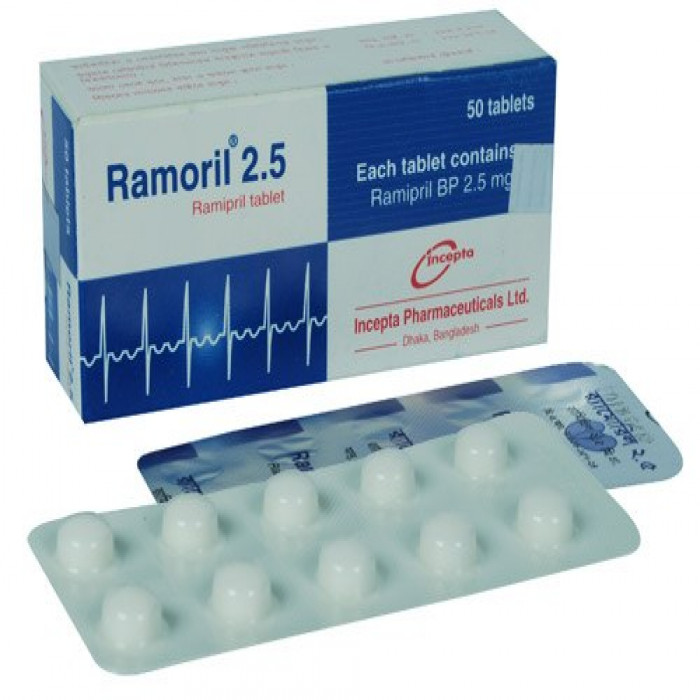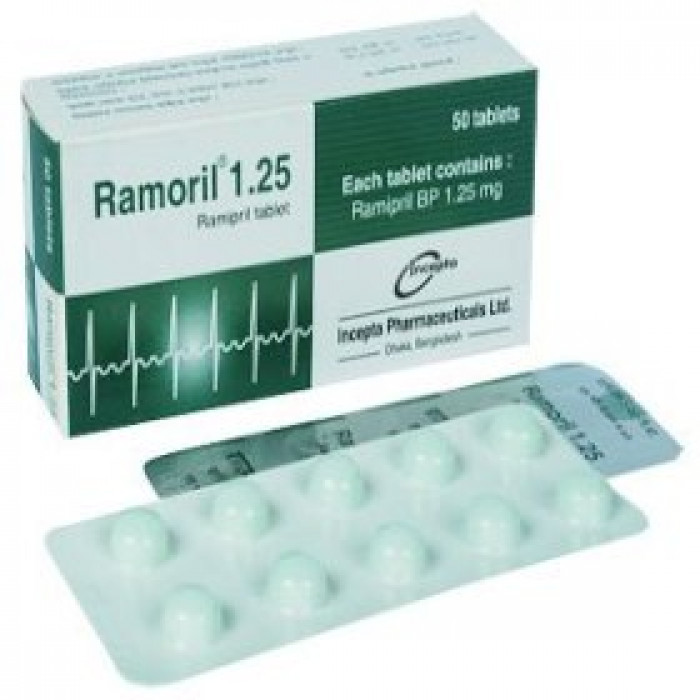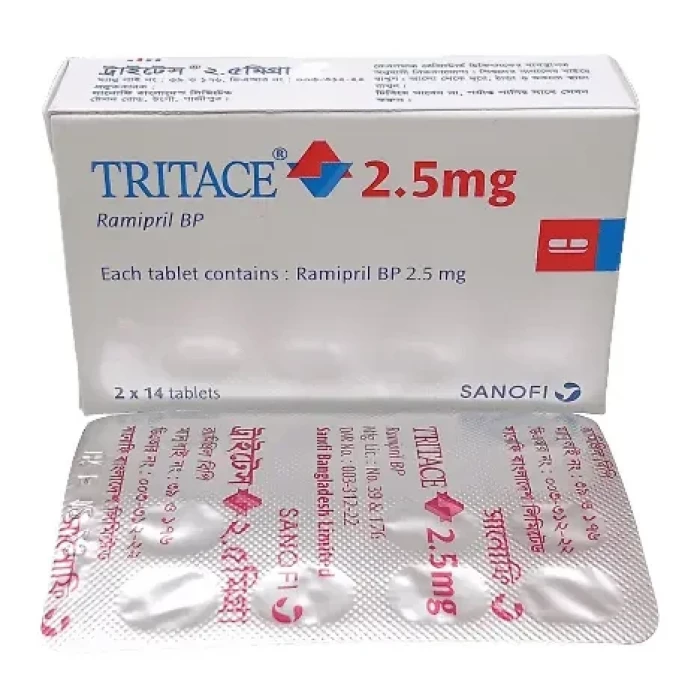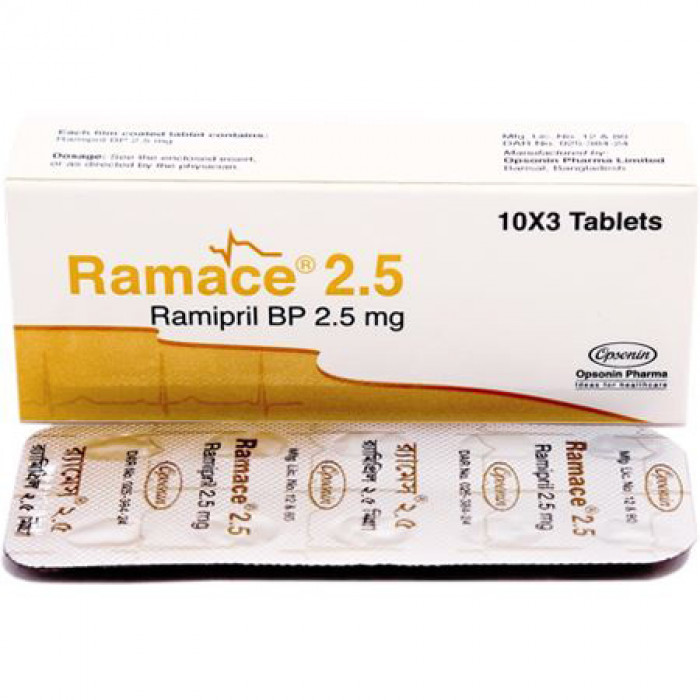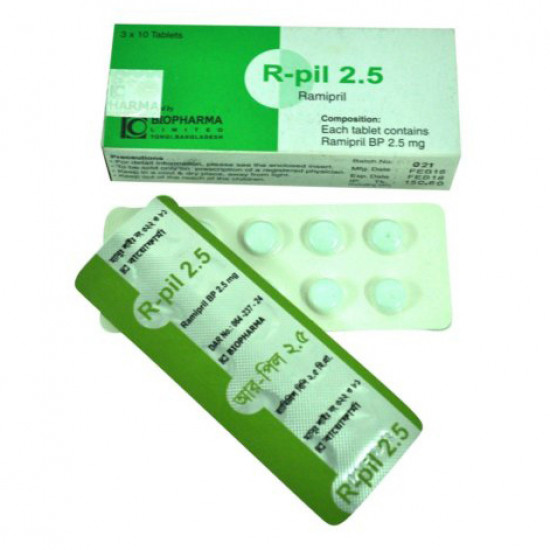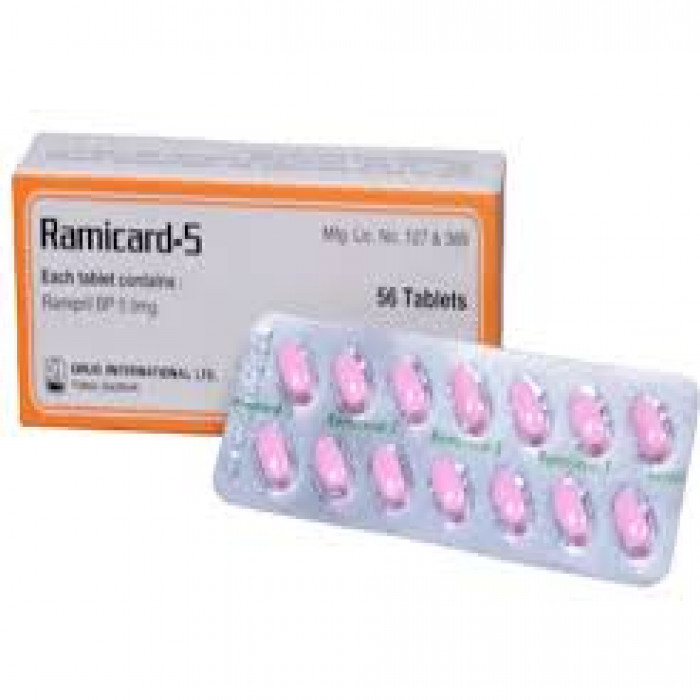
✔ 100% Authentic Product
👁️ Currently Viewing 2141
Ramipril 5mg Tablet is used for the treatment of
- Hypertension: To lower blood pressure, either as monotherapy or in combination with other antihypertensive agents.
- Congestive heart failure: Used alone or with diuretics.
- Treatment of patients showing signs of congestive heart failure within a few days after an acute myocardial infarction.
- Treatment of non-diabetic or diabetic nephropathy.
- Reduction in the risk of myocardial infarction, stroke, or cardiovascular death in patients at increased cardiovascular risk, such as those with manifest coronary heart disease, a history of stroke, peripheral vascular disease, or diabetes mellitus with at least one other cardiovascular risk factor.
Discount
Price: ৳ 107
MRP:
৳
112.7
5%
Off

100% Genuine Products, Guaranteed

Safe & Secure Payments, Always

Fast, Secure & Efficient Delivery

Proper Packaging
 Cash on Delivery - All over Bangladesh
Cash on Delivery - All over Bangladesh Regular Delivery - 12-24 Hours, Dhaka City* Charge Tk.39-59
Regular Delivery - 12-24 Hours, Dhaka City* Charge Tk.39-59 Regular Delivery - 24-48 Hours, Other Cities* Charge Tk.99-110
Regular Delivery - 24-48 Hours, Other Cities* Charge Tk.99-110
 ফ্রি ডেলিভারিঃ - ৯৯৯ টাকা+ অর্ডারে, ঢাকা
শহরে
ফ্রি ডেলিভারিঃ - ৯৯৯ টাকা+ অর্ডারে, ঢাকা
শহরে ফ্রি ডেলিভারিঃ - ২৯৯৯ টাকা+ অর্ডারে, ঢাকার
বাহিরে
ফ্রি ডেলিভারিঃ - ২৯৯৯ টাকা+ অর্ডারে, ঢাকার
বাহিরে
100% Genuine Products, Guaranteed
Safe & Secure Payments, Always
Fast, Secure & Efficient Delivery
Proper Packaging
 Cash on Delivery - All over Bangladesh
Cash on Delivery - All over Bangladesh Regular Delivery - 12-24 Hours, Dhaka City* Charge Tk.39-59
Regular Delivery - 12-24 Hours, Dhaka City* Charge Tk.39-59 Regular Delivery - 24-48 Hours, Other Cities* Charge Tk.99-110
Regular Delivery - 24-48 Hours, Other Cities* Charge Tk.99-110 ফ্রি ডেলিভারিঃ - ৯৯৯ টাকা+ অর্ডারে, ঢাকা
শহরে
ফ্রি ডেলিভারিঃ - ৯৯৯ টাকা+ অর্ডারে, ঢাকা
শহরে ফ্রি ডেলিভারিঃ - ২৯৯৯ টাকা+ অর্ডারে, ঢাকার
বাহিরে
ফ্রি ডেলিভারিঃ - ২৯৯৯ টাকা+ অর্ডারে, ঢাকার
বাহিরে
✅ Description:
Ramicard 5 is a medication containing Ramipril, classified as an Antihypertensive agent. It is primarily used to treat high blood pressure (hypertension), a condition characterized by elevated blood pressure exerted on the walls of blood vessels by circulating blood. Hypertension poses risks of various complications, and Ramipril helps in managing it effectively.
This medication also serves to mitigate the risk of kidney problems and can be employed as a treatment following a heart attack. Additionally, Ramicard 5 is indicated for the management of heart failure, a condition where the heart struggles to pump an adequate amount of blood. Symptoms of heart failure may include headache, breathlessness, excessive sweating, sleep disturbances, tingling sensations, and dizziness.
Your doctor may recommend lifestyle modifications alongside Ramicard 5, such as adopting a healthy diet, ensuring adequate sleep, managing weight and stress, and abstaining from smoking and alcohol consumption. Furthermore, relevant tests may be advised before and during treatment with Ramicard 5 to monitor its effectiveness and assess any potential side effects.
However, Ramicard 5 is contraindicated in patients with certain conditions, including kidney problems associated with reduced blood supply to the kidneys (renal artery stenosis), individuals undergoing dialysis, or those with collagen vascular diseases such as scleroderma and systemic lupus erythematosus. Pregnant or breastfeeding individuals should consult their doctor before using Ramicard 5, and it is not recommended for use in children and adolescents under 18 years of age.
Common side effects of Ramicard 5 may include headache, dizziness, hypotension (low blood pressure), sinusitis (sinus inflammation), diarrhea, and skin rash. If you experience any persistent or severe side effects, it is important to inform your doctor promptly.
Safety Advices

Alcohol
UNSAFE
Ramicard 5 may cause excessive drowsiness when consumed with alcohol.

Pregnancy
CONSULT YOUR DOCTOR
Consult your doctor before using Ramicard 5 during pregnancy. There is evidence of risk to the developing baby. However, in life-threatening situations, your doctor may prescribe it if the benefits outweigh the risks.

Breastfeeding
CONSULT YOUR DOCTOR
Consult your doctor before using Ramicard 5 while breastfeeding. Limited human data suggests it may pass into breast milk and harm the baby.

Driving
CAUTION
Ramicard 5 may decrease alertness, affect vision, or induce sleepiness and dizziness. Avoid driving if experiencing these symptoms.

Kidney
CAUTION
Use Ramicard 5 cautiously in patients with kidney disease. Dose adjustment may be necessary. Regular blood pressure monitoring is advised for dose adjustment.

Liver
CAUTION
Exercise caution when using Ramicard 5 in patients with liver disease. Dose adjustment may be needed. Notify your doctor if any signs of jaundice develop.
✔️ Uses of Ramicard 5
- Hypertension
- Prevention of heart attack and stroke
- Heart failure
✔️ How does Ramicard 5 work?
Ramicard 5 inhibits ACE, reducing angiotensin II levels, promoting vasodilation, and decreasing aldosterone secretion, resulting in hypotensive effects.
✔️ Side Effects of Ramicard 5
Commonly reported side effects include dizziness, headache, fatigue, and asthenia. Less frequent side effects include symptomatic hypotension, cough, nausea, vomiting, rash, urticaria, anxiety, and amnesia. Rarely, angioneurotic edema, anaphylactic reactions, and hyperkalemia may occur.
✔️ Quick Suggestions:
- Rise slowly to avoid dizziness, especially during initial use.
- Report persistent cough or throat irritation.
- Avoid potassium supplements and potassium-rich foods.
- Inform your doctor if pregnant, planning pregnancy, or breastfeeding.
✔️ Indication of Ramicard 5
Ramicard 5 is indicated for congestive heart failure, myocardial infarction, hypertension, and stroke prevention.
✔️ Pharmacology
Ramicard 5 mg inhibits ACE, reducing the conversion of angiotensin I to angiotensin II, a vasoconstrictor. This leads to decreased vasopressor activity and aldosterone secretion, resulting in antihypertensive effects. It's also effective in managing heart failure and reducing the risk of cardiovascular events.
✔️ Dosage & Administration of Ramicard 5
Dosage should be adjusted based on patient response and tolerance.
- Hypertension: Initial dose of 1.25-2.5 mg once daily, maintenance dose of 2.5-20 mg daily.
- Congestive heart failure after myocardial infarction: Initiate therapy as early as 2 days post-myocardial infarction with 2.5 mg twice daily, titrated to 5 mg twice daily.
- Prevention of major cardiovascular events: Start with 2.5 mg once daily for the first week, then 5 mg once daily for 3 weeks; the maintenance dose may increase to 10 mg once daily.
Overdose may cause excessive peripheral vasodilation, bradycardia, electrolyte disturbances, and renal failure. Management includes gastric lavage, adsorbents, and supportive care.
- Dosage adjustments are needed for renal impairment.
- No information is available for pediatric use.
- Consider reduced initial doses for the elderly and those with hepatic impairment.
Swallow tablets with liquid; do not chew or crush. Absorption is unaffected by food.
✔️ Interaction
Concurrent use of diuretics can cause severe hypotension and hyperkalemia. Interaction with lithium can increase serum lithium levels. NSAIDs may reduce antihypertensive effects and worsen renal function.
✔️ Contraindications
- Hypersensitivity to Ramicard 5 mg or any ACE inhibitor
- History of angioedema
- Concomitant use with sacubitril/valsartan, aliskiren-containing medicines, or angiotensin II receptor antagonists in certain cases
- Pregnancy
- Avoid ACE inhibitors with certain extracorporeal treatments
✔️ Pregnancy & Lactation
Avoid during pregnancy. Discontinue if pregnancy is detected. Not recommended during lactation.
✔️ Precautions & Warnings
Use caution in patients with impaired renal function, hyperkalemia, hypotension, or impaired hepatic function.
✔️ Storage Conditions
Store below 30°C, protect from light, and keep out of reach of children. Do not use beyond the expiry date.
⚠️Disclaimer:
At ePharma, we’re committed to providing accurate and accessible health information. However, all content is intended for informational purposes only and should not replace medical advice from a qualified physician. Please consult your healthcare provider for personalized guidance. We aim to support, not substitute, the doctor-patient relationship.




